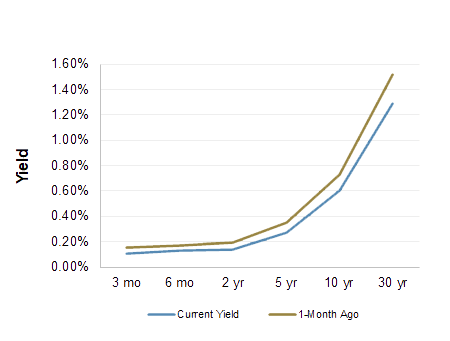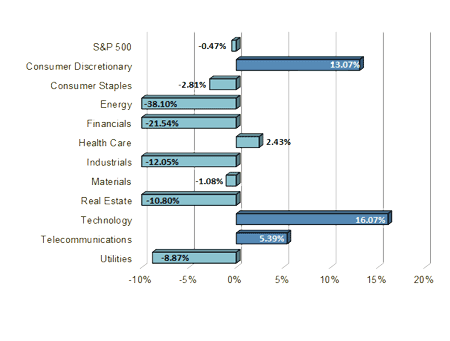Chief Economist Scott Brown discusses the latest market data.
The mid-month economic data reports were consistent with a strong but partial rebound from pandemic-related weakness. However, COVID-19 cases continued to rise, creating more risk for the economic outlook. Stock market action was mixed as earnings reports began to arrive.
Retail sales rose 7.5% in June, a stronger gain than expected, with the total now down just 0.6% since February. Motor vehicle sales rose 8.2%, up 4.8% from February (reflecting pent-up demand from March and April). Proprietary weekly data indicate lower retail sales in July. Industrial production rose 5.4% in June (-10.8% y/y), held down by a further decline in oil and gas well drilling. Manufacturing output rose 7.4% (-11.0% y/y), led by a further rebound in motor vehicle production, although gains were widespread across industries. Jobless claims were little changed at 1.3 million in the week ending July 11, consistent with prolonged weakness in the job market. The Fed’s Beige Book noted that economic activity improved “but remained well below where it was prior to the COVID-19 pandemic.”
Next week, the economic calendar thins. The Index of Leading Economic Indicators should post a strong gain in June, with positive contributions led by the decrease in jobless claims. Existing home sales are expected to have improved. New home sales are erratic but may pull back after a sharp gain in May (watch for revisions). Jobless claims have remained elevated in recent weeks, signaling more prolonged weakness in job market conditions.
Indices
| Last | Last Week | YTD return % | |
|---|---|---|---|
| DJIA | 26734.71 | 25706.09 | -6.32% |
| NASDAQ | 10473.83 | 10547.75 | 16.73% |
| S&P 500 | 3215.57 | 3152.05 | -0.47% |
| MSCI EAFE | 1852.56 | 1805.62 | -9.05% |
| Russell 2000 | 1467.56 | 1398.92.62 | -12.04% |
Consumer Money Rates
| Last | 1 year ago | |
|---|---|---|
| Prime Rate | 3.25 | 5.50 |
| Fed Funds | 0.00 | 2.37 |
| 30-year mortgage | 2.89 | 3.89 |
Currencies
| Last | 1 year ago | |
|---|---|---|
| Dollars per British Pound | 1.2553 | 1.243 |
| Dollars per Euro | 1.1384 | 1.122 |
| Japanese Yen per Dollar | 107.27 | 107.95 |
| Canadian Dollars per Dollar | 1.357 | 1.303 |
| Mexican Peso per Dollar | 22.447 | 19.065 |
Commodities
| Last | 1 year ago | |
|---|---|---|
| Crude Oil | 40.75 | 56.78 |
| Gold | 1800.30 | 1423.30 |
Bond Rates
| Last | 1 month ago | |
|---|---|---|
| 2-year treasury | 0.14 | 0.18 |
| 10-year treasury | 0.60 | 0.67 |
| 10-year municipal (TEY) | 1.15 | 1.21 |
Treasury Yield Curve – 07/17/2020

As of close of business 07/16/2020
S&P Sector Performance (YTD) – 07/17/2020

Economic Calendar
| July 22 | — | Existing Home Sales (June) |
| July 23 | — | Jobless Claims (week ending July 18) |
| — | Leading Economic Indicators (June) | |
| July 24 | — | New Home Sales (June) |
| July 27 | — | Durable Goods Orders (June) |
| July 28 | — | CB Consumer Confidence (July) |
| July 29 | — | FOMC Policy Decision, Powell Press Conference |
| July 30 | — | Real GDP (2Q20, adv. est., benchmark revisions) |
| July 31 | — | Employment Cost Index (2Q20) |
| — | Personal Income and Spending (June) | |
| August 3 | — | ISM Manufacturing Index (July) |
| August 7 | — | Employment Report (July) |
All expressions of opinion reflect the judgment of the Research Department of Raymond James & Associates, Inc. and are subject to change. There is no assurance any of the forecasts mentioned will occur or that any trends mentioned will continue in the future. Investing involves risks including the possible loss of capital. Past performance is not a guarantee of future results. International investing is subject to additional risks such as currency fluctuations, different financial accounting standards by country, and possible political and economic risks, which may be greater in emerging markets. While interest on municipal bonds is generally exempt from federal income tax, it may be subject to the federal alternative minimum tax, and state or local taxes. In addition, certain municipal bonds (such as Build America Bonds) are issued without a federal tax exemption, which subjects the related interest income to federal income tax. Municipal bonds may be subject to capital gains taxes if sold or redeemed at a profit. Taxable Equivalent Yield (TEY) assumes a 35% tax rate.
The Dow Jones Industrial Average is an unmanaged index of 30 widely held stocks. The NASDAQ Composite Index is an unmanaged index of all common stocks listed on the NASDAQ National Stock Market. The S&P 500 is an unmanaged index of 500 widely held stocks. The MSCI EAFE (Europe, Australia, Far East) index is an unmanaged index that is generally considered representative of the international stock market. The Russell 2000 index is an unmanaged index of small cap securities which generally involve greater risks. An investment cannot be made directly in these indexes. The performance noted does not include fees or charges, which would reduce an investor’s returns. U.S. government bonds and treasury bills are guaranteed by the US government and, if held to maturity, offer a fixed rate of return and guaranteed principal value. U.S. government bonds are issued and guaranteed as to the timely payment of principal and interest by the federal government. Treasury bills are certificates reflecting short-term (less than one year) obligations of the U.S. government.
Commodities trading is generally considered speculative because of the significant potential for investment loss. Markets for commodities are likely to be volatile and there may be sharp price fluctuations even during periods when prices overall are rising. Specific sector investing can be subject to different and greater risks than more diversified investments. Gross Domestic Product (GDP) is the annual total market value of all final goods and services produced domestically by the U.S. The federal funds rate (“Fed Funds”) is the interest rate at which banks and credit unions lend reserve balances to other depository institutions overnight. The prime rate is the underlying index for most credit cards, home equity loans and lines of credit, auto loans, and personal loans. Material prepared by Raymond James for use by financial advisors. Data source: Bloomberg, as of close of business July 16, 2020.
Markets & Investing Members of the Raymond James Investment Strategy Committee share their views on...
Markets & Investing Review the latest Weekly Headings by CIO Larry Adam. Key Takeaways ...
Technology & Innovation Learn about a few simple things you can do to protect your personal information...